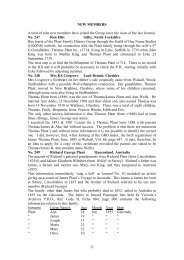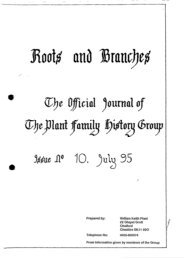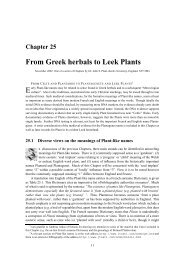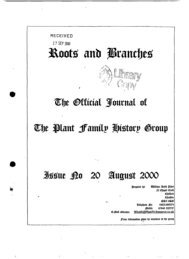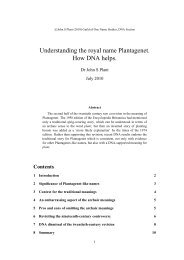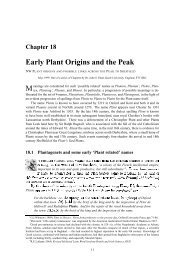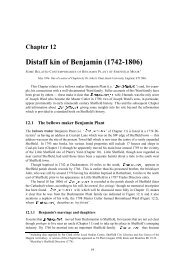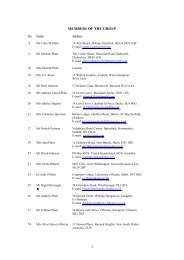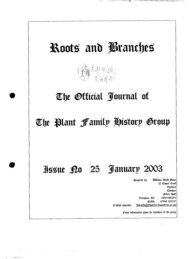full text - Plant Family History Group
full text - Plant Family History Group
full text - Plant Family History Group
Create successful ePaper yourself
Turn your PDF publications into a flip-book with our unique Google optimized e-Paper software.
6. Sum of three thousand pounds left to his son John.<br />
7. All property in Wheelock, Sandbach, including Nags Head Inn, Brewery<br />
and buildings, left to his son Joseph.<br />
8. All property in Newton near Middlewich, left to his son Joseph.<br />
9. Share of Brewery partnership left to his son Joseph.<br />
10, Control of Brewery by Trustees until Joseph reaches age of 25.<br />
11. Sum of five thousand pounds left to Joseph.<br />
12. All estate, salt works, brine pits, reservoirs, warehouses, tenement<br />
cottages, buildings, boat, dock, gardens, lands, hereditaments and<br />
premises called Malkins Bank, ,estate in Betchton, left to his<br />
daughter, Ann, wife of Joseph Lea and their children.<br />
13 Sum of f5,OOO (f136,OOO at 1985 value) left to executors to invest,<br />
all dividends and income to be paid to his daughter Emila.<br />
14. Emila went to work for Mrs Brovn at Lea Castle near Kidderminster.<br />
Mrs Brown appointed as Guardian of Emila with an understanding that<br />
she would perform the duties of a Mother-to-her.<br />
Note - Lea Castle was the home of the Knight family of Cookley. The castle<br />
no longer exists.<br />
Subsequently Emila's financial affairs and inheritance became complicated.<br />
On 12 October 1864 her brother, the Rev. Samuel <strong>Plant</strong>, of Weston-on-Trent,<br />
wrote to her at length on family matters assuring her that 'There does<br />
not appear to me to be the least reason to suppose that you will not have<br />
a very tolerable competence, tho' not so much as my Father intended'.<br />
However an unfortunate law suit took place in 1876-8 concerning the brine<br />
pits, these pits coming into her possession on the death of her sister<br />
Ann. There are a number of letters at this time between Emily (the records<br />
show that by now she was known as Emily) and Edward S Woolf, her cousin,<br />
together with some letters from her brother the Rev. Samuel <strong>Plant</strong>, usually<br />
urging caution and patience. At first the correspondence is friendly but<br />
by 12 June 1876 proceedings were 'ceasing to be in the shape of a friendly<br />
suit'. By 2 March 1878 they had become 'hostile' and the notion of a<br />
division of costs between the litigants and their lawyers 'could not be<br />
entertained for a moment'. What happened was that Emily's executors sold<br />
her share of the brine pits, by some legal manoeuvre, to the firm of Brunner<br />
Mond (later I.C.I.). They were sued and the case was van but the costs<br />
absorbed most of the money.<br />
Emily/Emila <strong>Plant</strong>, bt. 5 April 1832 married Ezra Harthan JP (1835 - 1917)<br />
and lived at Blackacres, Sandbach. She died March 1895 at Congleton.<br />
Owning considerable property elsewhere possibly explains why John <strong>Plant</strong><br />
did not make more effort to obtain the freehold of Elworth Hall from St<br />
Johns College, Cambridge. This was a distinct possibility in the early<br />
19th century. Legal enquiries were made. One of the <strong>Plant</strong> lawyers<br />
consulted Lord Brougham, the great lawyer, about the family title to the<br />
Elworth Hall Estate. Brougham replied 'What sort of man is your client<br />
Mr <strong>Plant</strong>' to tihich the 'family'lawyer answered 'a most honourable gentleman'.<br />
Lord Brougham's reply was, 'as far as I can see he might have stuck to<br />
it (ie Elworth)'.<br />
28



